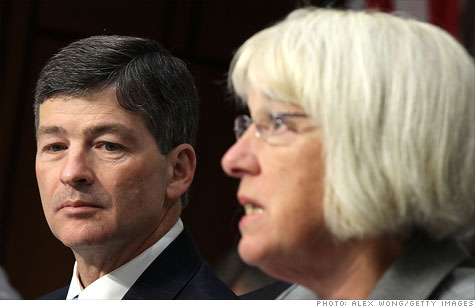
Tax revenue continues to make a deal difficult for the congressional debt committee, co-chaired by Republican Jeb Hensarling and Democrat Patty Murray.
NEW YORK (CNNMoney) -- Given how volatile markets have become, predicting how traders will react to the congressional debt committee next week is a dicey undertaking.
Two themes emerged in conversations with stock and bond strategists. First, Wall Street never expected much from the committee, thanks to the disastrous debt ceiling debate. Second, markets don't expect lawmakers to make meaningful decisions on fiscal reform until after the 2012 election.
But that doesn't mean the super committee can't move traders to fears ... or cheers.
The committee, by law, is supposed to vote on a plan by next Wednesday.
If the panel simply approves $1.2 trillion in debt reduction -- its minimum target to stave off automatic cuts in 2013 -- the market reaction will be "a great big yawn," said Adrian Conje, chief investment officer of Balentine, an investment advisory firm.
That deal, in other words, has been factored into stock traders' considerations.
A $1.2 trillion plan is considered small relative to what's needed but it could give markets a lift if it seems to demonstrate the start of real compromise between Democrats and Republicans on revenue increases and entitlement cuts, said John Toohey, vice president of equity investments at USAA.
Conversely, Toohey noted, a failure by the committee to agree on a deal at all could hurt stocks.
Another potential negative for stocks: A deal that would reduce debt by $1.2 trillion but take no short-term measures to boost the economy, such as extending temporary payroll tax relief or providing another temporary extension of federal emergency jobless benefits for the long-term unemployed.
Of course, Congress can still decide to extend those measures separately before the end of the year, but a super committee proposal had been considered a possible vehicle.
"If that all goes away, that could mean a 1.5% to 2% drag on GDP growth next year," Toohey said.
It's even less clear how bonds might respond.
Traders may be disappointed if the super committee can't come to a deal or can only come to a deal worth less than $1.2 trillion. But their disappointment is likely to be offset by concerns elsewhere in the world. The same holds should a super committee failure trigger another downgrade or negative ratings action.
"Global and U.S. investors will continue to be disappointed in U.S. fiscal policy but will look at Europe and Japan and not see governments with unassailable credit ratings in the future," said Steve Van Order, fixed income strategist at Calvert Investments
There is, of course, one super committee action that would make both stock and bond markets cheer: Agreement on a true "grand bargain" -- the kind of proposal that reduces debt by at least $3 trillion to $4 trillion over the next decade but is mindful of not undermining the economic recovery in the short-term.
The Holy Grail for traders? More certainty about long-term fiscal policies and the balance lawmakers will strike between spending and revenue in the future.
"Markets want less ideology and more problem-solving," Conje said. "They want clarity. They want to know the rules of the road."
Given that the two sides have yet to produce a single plan that they can at least agree to vote on, markets may have to wait a little longer. ![]()
| Overnight Avg Rate | Latest | Change | Last Week |
|---|---|---|---|
| 30 yr fixed | 3.80% | 3.88% | |
| 15 yr fixed | 3.20% | 3.23% | |
| 5/1 ARM | 3.84% | 3.88% | |
| 30 yr refi | 3.82% | 3.93% | |
| 15 yr refi | 3.20% | 3.23% |
Today's featured rates:
| Latest Report | Next Update |
|---|---|
| Home prices | Aug 28 |
| Consumer confidence | Aug 28 |
| GDP | Aug 29 |
| Manufacturing (ISM) | Sept 4 |
| Jobs | Sept 7 |
| Inflation (CPI) | Sept 14 |
| Retail sales | Sept 14 |